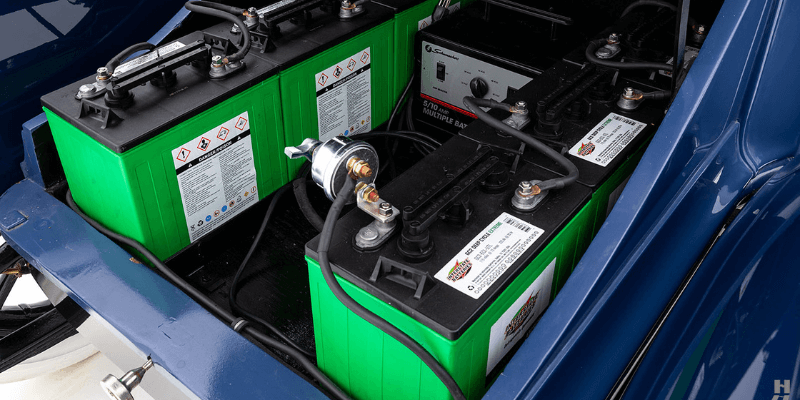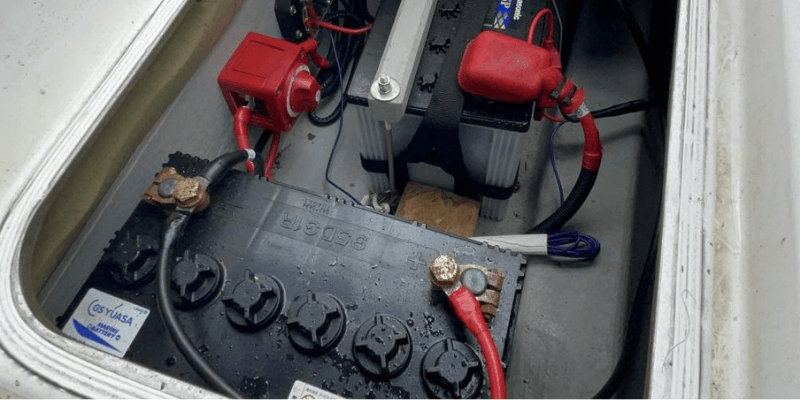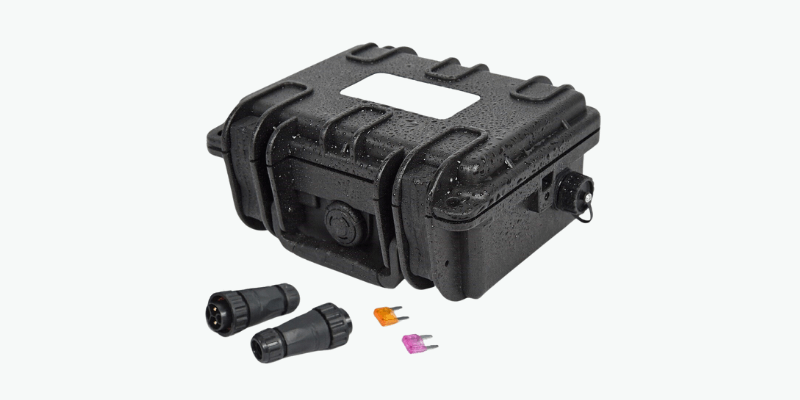Baterai lithium tidak boleh terendam air karena risiko kerusakan. Berkualitas tinggi baterai LiFePO4, seperti holo baterai solusi khusus, dirancang dengan penyegelan yang luas dan peringkat IP65 untuk ketahanan kelembaban. Hari ini, mari kita jelajahi apakah baterai lithium bisa basah.
Baterai lithium vs baterai asam timbal
Memahami baterai lithium membutuhkan membandingkannya dengan baterai timbal-asam.
Baterai Asam Timbal
Ini terdiri dari dua piring timah – katoda bermuatan positif dan bermuatan negatif anoda, tenggelam dalam asam sulfat. Ketika daya ditarik, ion sulfat bergerak ke pelat negatif, melepaskan elektron untuk listrik. Selama pengisian daya, proses ini terbalik. Air suling harus ditambahkan secara teratur untuk mempertahankan elektrolit keseimbangan.

Baterai Litium
Mirip dengan baterai asam timbal, baterai lithium memungkinkan ion lithium untuk melakukan perjalanan melalui elektrolit dan melepaskan elektron saat energi ditarik; Ini juga terbalik selama pengisian daya.
Namun, mereka disegel dan tidak memerlukan perawatan atau akses untuk menyeimbangkan elektrolit. Desain ini melindungi komponen internal dan meningkatkan keamanan dibandingkan dengan baterai timbal-asam.
Bisakah Baterai Lithium Menjadi Basah?
Jawaban singkatnya kadang -kadang, tergantung pada kualitas dan desain baterai.
Kustom Holo Battery baterai laut sepenuhnya disegel dan dinilai IP65, membuatnya tahan air. Mereka berkinerja baik di lingkungan yang lembab, tetapi paparan kelembaban tinggi yang berkepanjangan dapat menyebabkan kerusakan yang tidak dapat diubah.
Untuk baterai lithium-ion lainnya, periksa spesifikasi paparan air pabrikan. Sementara sebagian besar baterai lithium adalah sel yang disegel dengan pelindung air, tidak semua segel sama.
Secara umum, baterai lithium dapat menahan hujan atau percikan tetapi mungkin memerlukan tindakan pencegahan tambahan berdasarkan rekomendasi pabrikan.
Terlepas dari tingkat ketahanan air mereka, tidak ada baterai lithium yang harus terendam dalam air, karena dapat sangat merusak kinerja atau membuat mereka tidak dapat dioperasikan.

Apa yang terjadi saat baterai lithium basah?
Biasanya, jawabannya bukan apa -apa!
Desain baterai lithium baterai holo yang disegel melindungi komponen -komponen penting dari paparan air sesekali.
Namun, kontak yang berkepanjangan dapat merusak komponen yang sensitif seperti terminal baterai. Air di dalam baterai dapat memicu reaksi kimia berbahaya dan menciptakan jalur saat ini antara terminal, yang mengarah ke pelepasan yang tidak disengaja.
Bagaimana air garam memengaruhi baterai lithium?
Paparan air garam dapat membahayakan baterai lithium dalam beberapa cara:
- Korosi: Air garam mengkorosiasi terminal baterai dan komponen logam, mengurangi konduktivitas dan kinerja listrik.
- Sirkuit Pendek: Sebagai konduktor yang baik, air asin dapat menyebabkan sirkuit pendek jika memasuki casing baterai, yang menyebabkan kepanasan, kebocoran, atau kebakaran.
- Reaksi Kimia: Air garam dapat memicu reaksi kimia berbahaya dalam baterai yang mempercepat degradasi komponen.
- Pengurangan Umur: Paparan yang berkepanjangan secara signifikan memperpendek umur baterai lithium karena korosi dan kerusakan internal.
Bisakah Anda mengisi ulang baterai lithium basah?
Jaga agar baterai Anda tetap kering. Air minimal atau lingkungan yang lembab tidak akan mempengaruhi pengisian ulang, tetapi hindari pengisian ulang jika baterai terendam dalam air. Jika Anda mencurigai kerusakan air pada baterai lithium Anda, jangan isi ulang. Sebaliknya, buang dengan aman.

Bisakah Anda meninggalkan baterai lithium di luar?
Baterai lithium disegel, tidak menimbulkan bahaya ketika dibiarkan di luar.
Baterai LIFEPO4 dapat beroperasi dalam berbagai suhu, memungkinkan mereka berfungsi dalam kondisi cuaca yang berbeda. Dengan demikian, penggunaan luar ruangan sesekali tidak boleh merusaknya.
Namun, hindari mengekspos baterai lithium ke elemen untuk waktu yang lama. Melindungi mereka dari hujan, angin, air, dan suhu ekstrem akan memperpanjang umur mereka dan menghemat uang dan kerumitan dalam jangka panjang.
Tindakan pencegahan apa yang harus saya ambil untuk menjaga baterai lithium saya agar tidak basah?
Untuk melindungi baterai lithium Anda dari kelembaban, pertimbangkan tindakan pencegahan ini:
- Penyimpanan: Simpan baterai di lokasi yang kering dan aman jauh dari paparan air.
- Penyegelan: Pastikan kompartemen baterai disegel dengan benar untuk mencegah masuknya air.
- Perlindungan: Gunakan kasing tahan air saat membawa atau menyimpan baterai di lingkungan yang lembab.
- Hindari perendaman: Jangan pernah merendam baterai lithium dalam air atau memaparkannya pada kelembaban yang berlebihan.
- Pemeriksaan reguler: Periksa selungkup dan segel secara berkala untuk keausan atau kerusakan yang dapat membahayakan kedap air.
Dengan mengikuti langkah -langkah ini, Anda dapat mempertahankan integritas dan fungsi baterai lithium Anda.

Apa itu peringkat IP65?
Peringkat Perlindungan Ingress (IP) menilai kualitas penutup di sekitar perangkat elektronik, menunjukkan efektivitasnya terhadap benda asing dan kelembaban. Peringkat IP Gunakan skala dua digit: Digit pertama (0-6) mengukur perlindungan intrusi, sedangkan digit kedua (0-9) mengukur perlindungan kelembaban.
Baterai lithium khusus kami memiliki peringkat IP65, artinya mereka “Debu dengan ketat” dan tahan air terhadap jet bertekanan rendah 6.3mm dari sudut mana pun. Ini memastikan baterai kami tetap aman di lingkungan yang cukup lembab atau ketika terpapar air dalam jumlah kecil, karena level ini tidak dapat menembus penyegelan pelindung mereka.
Cara menguangkan baterai Anda
Jika baterai lithium Anda akan terkena kelembaban, pertimbangkan air yang tahan air. Kompartemen yang aman dan bergaya kotak kering dan baterai yang membungkus atau pelapisan dengan rapat dalam bahan seperti pelapis uretan, silikon, atau cat karet dapat memberikan perlindungan ekstra, selama terminal tetap dapat diakses.
Kiat Pro: Gunakan kotak baterai untuk menjaga baterai tetap hangat dan kering. Wadah ini melindungi terhadap air dan bahaya selama transportasi. Mereka sering memiliki pelabuhan untuk menggambar kekuatan dan pengisian tanpa pemindahan, memberikan ketenangan pikiran nelayan es dalam kondisi ekstrem.

Seberapa amankah baterai lithium di atas kapal?
Baterai Lithium Marine sangat aman untuk digunakan di atas air dengan perawatan dasar. Mereka ideal untuk mereka yang membutuhkan penyimpanan yang luas, pengisian cepat, dan kinerja yang andal dalam berbagai kondisi.
Dibandingkan dengan baterai asam timbal, opsi lithium menawarkan pemasangan yang lebih fleksibel dan mengurangi risiko bahaya di laut yang kasar.
Baterai lithium yang disegel sepenuhnya memiliki peluang lebih rendah untuk kerusakan yang berhubungan dengan air, dengan lithium-besi fosfat (lifepo4) sangat aman dan stabil terhadap pelarian termal.
Jangan panik jika baterai lithium Anda basah
Jangan khawatir jika baterai lithium Anda basah
Baterai lithium bisa basah. Berkat desain mereka yang disegel, mereka dapat menahan kontak langsung dengan air tanpa kerusakan parah atau abadi. Sementara paparan air yang diperpanjang bisa berbahaya, tindakan pencegahan yang tepat akan memastikan baterai Anda tetap beroperasi.


